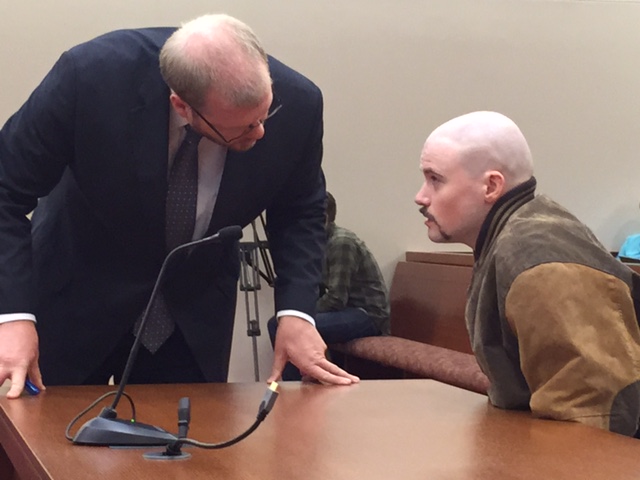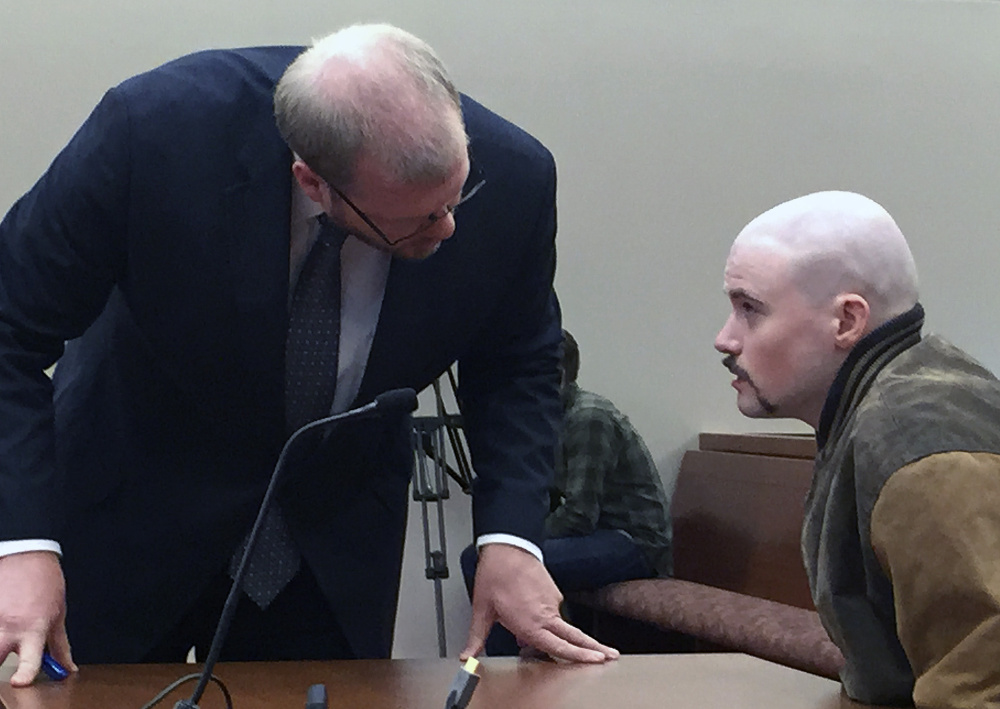AUGUSTA — It is now up to a judge to decide whether the state forensic hospital can medicate Leroy H. Smith III involuntarily in an attempt to restore him to mental competence so he can be tried for murder in connection with the slaying and dismembering of his father in May 2014.
Justice Donald Marden said Wednesday during a hearing at the Capital Judicial Center that he would rule later in writing after reviewing prospective orders submitted by attorneys for both the state and the defense. It’s the first case to come before a judge in Maine following a new state law that went into effect in July that allows a judge to order that a defendant to be medicated involuntarily to restore competency.
Smith’s attorneys, Scott Hess and Pamela Ames, object to the idea of forcing medication on Smith, saying that is not in his best interest, since he then would face trial.
Smith, now 26, of Gardiner, was arrested May 6, 2014, on the murder charge and has been held at Riverview Psychiatric Center, the state forensic hospital in Augusta, and in the Kennebec County jail, since then.
More than a dozen news media representatives and some Riverview treatment providers watched the testimony and oral arguments.
Last January, Smith, who has been diagnosed with a delusional disorder, was found incompetent to enter a plea to an indictment charging him with intentional or knowing murder or depraved indifference murder in connection with the slaying of Leroy Smith Jr., 56, in the Cannard Street apartment they shared.
Smith at Wednesday’s hearing on the involuntary medication proposal, lacked the long dark hair and beard he has had at previous court occasions. He had a mustache but no beard, and his head was shaved. He wore a brown, long-sleeved jacket and blue pants. At one point during Wednesday’s hearing, Smith leaned over the table and whispered to Hess. Otherwise, Smith leaned back in his chair and watched silently without moving. His wrists were cuffed and his legs shackled, and a chain linked the two and hooked to a wide leather belt around his waist.
While at Riverview, Smith was treated for about 10 days with Seroquel, a psychiatric medication, for sleep problems and also given other psychotropic medication during two psychiatric emergencies, one in February and one in November.
On Wednesday, Miriam Davidson, a psychiatric mental health nurse practitioner at Riverview who is part of Smith’s treatment team, testified, “It’s concerning to me that Mr. Smith has been on our unit for so long and has been untreated for his mental illness,” Davidson said. “It’s concerning that we do not have the ability to do that.”
She said that if involuntary treatment is approved, it would start with Zyprexa, which Smith responded to during the most recent psychiatric emergency when he was presenting a danger to others. She said it would be given as an injection if Smith refused to take the oral dose. But she said oral medication is always offered first.
In November, Smith punched a mental health worker in the face as personnel attempted to get him to take an antipsychotic medication, Davidson said. Smith was restrained and given a shot of the medicine after refusing to take oral medication, she added.
She said policies permit involuntary administration of medication for up to 72 hours — which can be renewed if needed — or until the person is no longer viewed as dangerous, whichever is shorter.
The hospital would like to put Smith on a regimen of antipsychotic medication for six months, Davidson said, with the option of bringing in evaluators from the State Forensic Service sooner if treatment providers believe Smith responds more quickly to the medication and appears to be regaining competence to enter a plea and/or stand trial.
She said Smith now refuses to participate in his treatment team meetings.
“He believes he’s being held inappropriately at the hospital,” she said. “I think he overall feels very persecuted most of the time.”
Smith has told authorities that he stabbed his father in the neck and head, cut up the body and placed pieces in numerous trash bags, some of which he discarded in a rural area of neighboring Richmond.
He also said he rented a carpet steamer to help clean up the blood, and a neighbor saw the younger Smith walking along the road to his home with the steamer.
According to information in an affidavit by Maine State Police Detective Jonah O’Roak, who sought an arrest warrant, the younger Smith told case investigators he killed his father and then “filleted him and buried him in the woods because his dad sexually assaulted him his whole life.”
There was no record of Leroy Herbert Smith Jr. on a sex offender registry in the United States, and the younger Smith had lived in Massachusetts until moving in with his father.
Smith several times has tried to fire his attorneys and claimed to be a political prisoner.
At one point, he told a different judge that in 2011 a gun was held to his head in an incident that he said involved the heavy metal band Slayer.
“I had a gun held against my head and was sworn to keep secret about what I am,” Smith said at the time. “They refused investigating any persons responsible. The whole entire group Slayer was there. I was told then that what they did was too overboard. I sent them a message on Facebook and Jeff Hanneman guitarist took his own life. He took his own life May 5.” (Information on the band’s official website says Hanneman died May 2, 2013, of alcohol-related cirrhosis.)
A letter in Smith’s court file from Davidson says “Smith has been diagnosed with a delusional disorder and medication is necessary and substantially likely to render Mr. Smith competent.” She also said that the side effects of the medication are unlikely to interfere with his ability to assist in his own defense.
“The state asserts that the court-authorized medication will significantly further important state interests,” Assistant Attorney General Deborah Cashman wrote in her motion seeking approval for that treatment.
Cashman’s motion says Smith’s thought processes, which had been described as “floridly delusional,” had improved while he was taking Seroquel.
However, Smith later refused to continue taking it.
On Wednesday, Peter Donnelly, a clinical psychologist who did a forensic evaluation of Smith in July, testified, “His thinking for the most part was logical.”
Donnelly also said, “I was actually impressed with his capacity to maintain rational thought and to assist in his defense.”
However, Donnelly told Cashman that Smith said the state’s role was to “persecute” rather than “prosecute” him.
And Donnelly said that during the evaluation, Smith at one point said spontaneously that he was head of a kingdom and that his name was Icarus. Donnelly said Smith made a reference to Slayer and Phish, both bands, and said he “had to do something to save the world.”
In her closing argument, Cashman said the court should find that the state has presented “clear and convincing evidence” that involuntarily medicating Smith is appropriate both for restoration of competency and for his own health.
She suggested the judge order Smith involuntarily medicated for a period of at least six months and have a judicial review after four months.
Hess argued that the testimony offered Wednesday was insufficient to meet statutory requirements. He also noted that forcing the medication on Smith would be done under a law that just went into effect in Maine in July.
The Maine law is based on a 2003 U.S. Supreme Court ruling in Sell v. United States. The Maine law allows a judge to order that a defendant be medicated involuntarily to restore competency.
In making the ruling, a judge has to consider whether “important state interests are at stake,” whether it is “substantially likely to render the defendant competent to proceed” and unlikely to produce side-effects that would interfere with the defendant assisting defense attorneys, whether involuntary medication is necessary, whether “any alternative, less intrusive treatments” are unlikely to succeed, and whether the medication “is in the defendant’s best medical interest.”
“If it is ordered, we would ask for an evaluation forthwith of competency for a baseline and progress reports every 30 days,” Hess said. He also said he would want a judicial review in late March or early April. Marden noted that this is the first such case to come before the court under the new law, and that he anticipated issuing findings of fact and a detailed analysis as well as an order.
Betty Adams — 621-5631
badams@centralmaine.com
Twitter: @betadams
Copy the Story LinkSend questions/comments to the editors.






Success. Please wait for the page to reload. If the page does not reload within 5 seconds, please refresh the page.
Enter your email and password to access comments.
Hi, to comment on stories you must . This profile is in addition to your subscription and website login.
Already have a commenting profile? .
Invalid username/password.
Please check your email to confirm and complete your registration.
Only subscribers are eligible to post comments. Please subscribe or login first for digital access. Here’s why.
Use the form below to reset your password. When you've submitted your account email, we will send an email with a reset code.